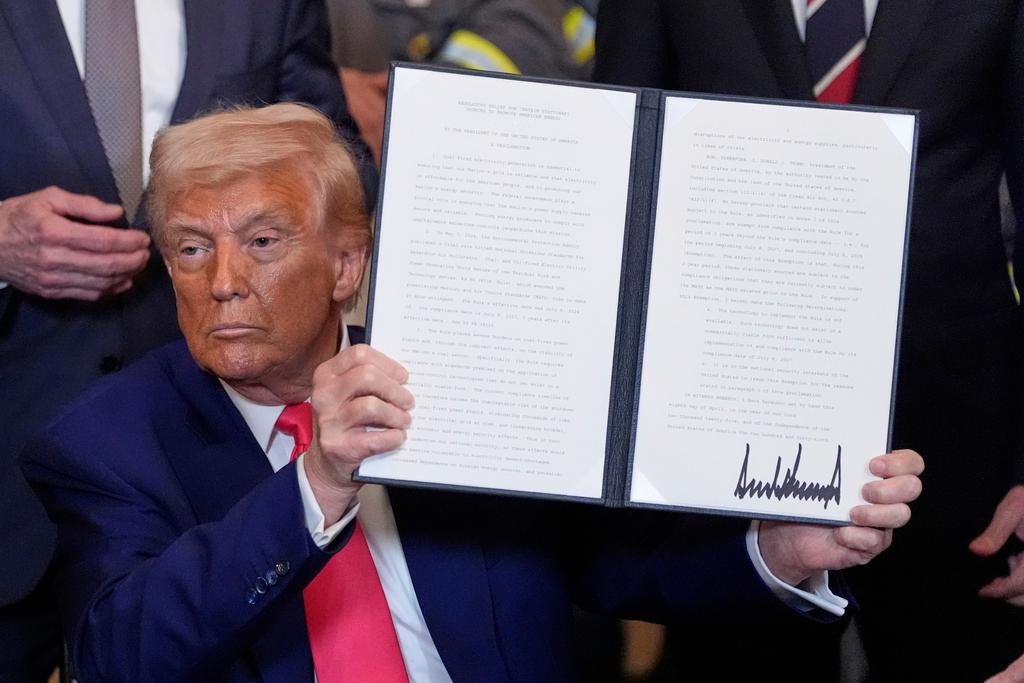


Five American Indian tribes filed a lawsuit Monday against President Donald Trump, just hours after the he announced he'd drastically shrink the Bears Ears National Monument in Utah.
At the center of the debate is the Antiquities Act of 1906, which allows presidents to establish national monuments. The tribes say, however, the law doesn't give presidents the legal authority to reduce or modify national monuments.
The Native Americans Rights Fund, which is headquartered in Boulder, represents three of the tribes on the Bears Ears lawsuit: the Hopi Tribe, Ute Mountain Ute Tribe and Zuni Tribe. NARF senior staff attorney Matthew Campbell tells Colorado Matters this land has cultural and spiritual significance for the tribes, and that this is not just about conservation, but about tribal sovereignty as well.
“[This] was the first national monument that was established at the request of Native nations,” Campbell says. “And so it really is a matter of sovereignty, based on this historical dealings between the Native nations and the United States.”
President Barack Obama declared Bears Ears a national monument in December 2016. The monument in southern Utah was initially proposed by a coalition of the five tribes.
Trump called the monument a case of federal governmental overreach. During a speech at the Utah State Capitol in Salt Lake City, he said past presidents "severely abused the purpose, spirit and intent of [this] century-old law... this law requires that only the smallest, necessary area be set aside for special protection."
Late Wednesday, the large outdoor retailer Patagonia filed another lawsuit against the Trump administration over its decision to shrink Bears Ears. Among Patagonia's co-plaintiffs is Access Fund, a Boulder-based national group that advocates access to and preservation of climbing spaces.
Trump also issued a proclamation to reduce the Grand Staircase-Escalante National Monument in Utah. Environmental groups are suing him, Interior Secretary Ryan Zinke and Bureau Land Management director Brian Steed over that move. The Society of Vertebrate Paleontology are one of the plaintiffs named on an additional lawsuit over the scaling back of this monument.
Interview Highlights:
Campbell on the significance of Bears Ears to these tribes:
"It's a place that's integrally tied to their cultures. Just like Christians, Muslims and Jewish people have creation stories about Jerusalem and other areas, the five tribes in this region have stories that date back since time immemorial about the Bears Ears region. And so really this area is an integral part of their culture and who they are as a people. It's a place that they can go to gather herbs and medicines, to hunt and fish. They still go there today to have ceremonies there, and to pray, and to honor their ancestors that lived there long ago.”
On how he sees this differently than when past presidents altered national monuments:
“It hasn't been tested legally, for one. And there have been a few modifications in somewhat unusual circumstances, but in the 1970s Congress passed, and confirmed its understanding when it passed the Federal Land Policy and Management Act. What Congress did was it confirmed that it was reserving to itself the authority to modify and revoke withdrawals for national monuments created under the Antiquities Act… Really, no president has tried to revoke a national monument to the extent that President Trump has here."
Transcript:
Ryan Warner: This is Colorado Matters, from CPR News, I'm Ryan Warner. Five American Indian tribes are suing President Trump. They filed this lawsuit hours after the President announced he'd shrink the Bears Ears National Monument in neighboring Utah.President Donald Trump: Past administrations have severely abused the purpose, spirit and intent of a century old law known as the Antiquities Act. This law requires that only the smallest necessary area be set aside for special protection as National Monuments.RW: Trump of course also issued a proclamation to reduce the Grand Staircase Escalante National Monument, also in Utah. The Native American Rights Fund, which is headquartered in Boulder, represents three of the tribes suing over Bears Ears, and staff attorney Matthew Campbell is on the phone with me. Hi Matthew.Matthew Campbell: Good morning, Ryan. Thank you for having me.RW: One of the three tribes you're representing is the Ute Mountain Ute here in Colorado. And these tribes have asked for courts to put an immediate hold on the president's actions so that no new drilling or mining permits can be issued before this is settled legally.I'll ask you briefly to take us to Bears Ears, and tell us what's there, and why it's so important to these tribes.MC: Sure Ryan. I appreciate you having me on. You know, Bears Ears is really, it's a homeland for the Native people, for the Hopi, the Navajo, the Ute, and the Pueblo of Zuni. It's a place that's integrally tied to their cultures. Just like Christians, Muslims and Jewish people have creation stories about Jerusalem and other areas, the five tribes in this region have stories that date back since time immemorial about the Bears Ears region.And so really this area is an integral part of their culture and who they are as a people. It's a place that they can go to gather herbs and medicines, to hunt and fish. They still go there today to have ceremonies there, and to pray, and to honor their ancestors that lived there long ago. So really this is a place that, because it's so tied to who they are as a people, it's tied to their history and their cultures, it's one of the most important places for Native people, and for Indian country at large. And so when Bears Ears was attacked, they moved very quickly to have that set aside and declared unlawful.RW: I mean, it's interesting because the administration paints a different picture. The Antiquities Act is meant to protect both natural and cultural treasures, and in Trump's proclamation to modify Bears Ears, he says some of the artifacts identified when the monument was established were "not unique to the monument, or are not of significant or historic interest." The proclamation also says that many of the objects are not in danger. What evidence do you have that this is unique, and in a way, more important than other lands in the West, to these tribes?MC: Sure. Well, we wholeheartedly disagree with that assertion. There, if you look at some of the sites that were left out, or purportedly left out from protection now, you know, the Bears Ears reduction or revocation that President Trump issued reduces it or replaces it with something that's 85% smaller than what it was. So there's a lot of areas that were left out now from protection. There are certain ancient dwellings and buildings, such as a kiva, very important kivas that are still used by the Pueblos today in their ceremonies, and there's some of these ancient kivas that are left out. There's rock art and other rock art formations that were left out, that date back since time immemorial, and provide certain insights to the tribes about their cultures and who they are.And these items were left out from the new proclamation that Trump issued on Monday, and so the other aspect to the reduction, you talked about the protections, and so what it does is it will open this area up for greater looting and grave robbing, and other harassment to these sites. It also opens up the area to mining and oil and gas development, and other types of development as well.RW: I'll say that the five tribes are not the only ones suing. In fact, late Wednesday the outdoor clothier Patagonia announced that it was filing suit, and a Colorado-based climbing advocacy group joined in that suit, Boulder's Access Fund.So indeed, the administration wants to reduce the 1.3 million acre Bears Ears Monument to less than 23% of that area, and as we heard, the Antiquities Act of 1906 is at the heart of this case. It gives presidents the authority to establish National Monuments, not, apparently, to reduce or modify them without Congress. But what do you say to Trump's assessment that previous presidents have abused the law to put massive amounts of land under government control?MC: Well, I think there's a little bit of a misconception about that, Ryan. When you look at the history behind the Antiquities Act, there are many places of major importance to the United States that were protected under the Antiquities Act, and one example is the Grand Canyon. It was first protected under the Antiquities Act, and it was probably one of the first National Monuments that was created. Of course, because of its importance it was later turned into a National Park, and everyone knows that the Grand Canyon is of major importance.And so the other thing to mention is like you said, the Antiquities Act provides the president with the authority to create National Monuments, but not to modify them, and so Congress was clear in what it was doing when it enacted the Antiquities Act, by providing the president with authority to create National Monuments, but not to modify or shrink them once they've been created.RW: And yet, this isn't the first time a president has shrunk a National Monument, using Executive Power, right? I mean, in 1912, President Taft eliminated a small portion of what was then Mount Olympus National Monument in Washington State. Years later, President Wilson shrunk the Monument by half, and President Coolidge removed a section in 1929. Here in Colorado, this is interesting, President Eisenhower modified the Great Sand Dunes National Monument. So what's different? I mean, is it just that this hasn't been tested legally?MC: Well, Ryan, it hasn't been tested legally, for one. And there have been a few modifications in somewhat unusual circumstances, but in the 1970s Congress passed, and confirmed its understanding when it passed the Federal Land Policy and Management Act, FLPMA, and through FLPMA what Congress did was it confirmed that it was reserving to itself the authority to modify and revoke withdrawals for National Monuments created under the Antiquities Act.And since that statute was passed, and since Congress clarified that when it passed FLPMA, no president has attempted to take this type of action. And really, no president has tried to revoke a National Monument to the extent that President Trump has here in this unprecedented manner, of really reducing it by 85%, which effectively is a revocation.RW: I imagine that this is, in part, what will be tested in the courts. I'd like at this point to hear from the Secretary of the Interior. Secretary Zinke held a press conference earlier this week, and he told reporters this shrinking is not about energy, and he rebuked the claim that the President stole the land.Secretary Ryan Zinke: No one loves public land more than I. But what I do love is public lands being available for the benefit and enjoyment of the people. We disagree vehemently on shutting roads down, shutting access down. In one case in the review, all motorized vehicles was stopped until a transportation plan was put in at a time undetermined. And it had effected even stopping groomed trails for cross country skiing.RW: I have a question about Secretary Zinke's assertion that he met with the tribes, and that this was an open discussion. What's your sense of that?MC: Well, I think Secretary Zinke really was just trying to check off the box, and it was really a sham process to just say that they did meet with the tribes. When he went out to Utah initially, he met with the tribes and tribal representatives really for about a little over an hour, and then he spent the rest of the day and a half there, meeting with Utah State Delegation and other Utah State Representatives.So the purported meeting with the tribes really was somewhat of a sham process. And of course, they did not take into consideration what the tribes told them because when the tribes met with the administration, they voiced their major concern about any modification to the Monument as it was established, and opposed any such actions.RW: I'll say that Secretary Zinke has recommended keeping Federal land removed from National Monuments under Federal management, and he has also recommended three new National Monuments, one in his home state of Montana, as well as Kentucky and Mississippi. Is this a sovereignty question at all, Matthew Campbell, from the Native American Rights Fund? I know that Bears Ears is adjacent to tribal lands, much of it already Federal land, but do you see this as a question of Indian sovereignty to some regard?MC: Well, the Bears Ears National Monument was the first National Monument that was established at the request of Native nations, and it's a place that's so important and so powerful that it brought the five tribal Nations together to advocate as governing bodies for its protections. And so President Obama did a wonderful job of treating the tribes as sovereign governments, as the United States should, in that government to government relationship. And the Trump administration has come in and not really taken that same approach and dealt with the tribes on that government to government basis. The tribes requested a meeting with President Trump to talk to him before he took any actions, and that request was denied. And so it really is a matter of sovereignty, based on this historical dealings between the Native nations and the United States.RW: I want to thank you for your time.MC: Thank you, Ryan.RW: Matthew Campbell, Senior Staff Attorney with the Native American Rights Fund, or NARF. It's based in Boulder, and represents three of the five tribes suing President Trump over his proclamation to shrink Bears Ears National Monument, in particular. This is ColoradoMatters, from CPR News. |
Related:









